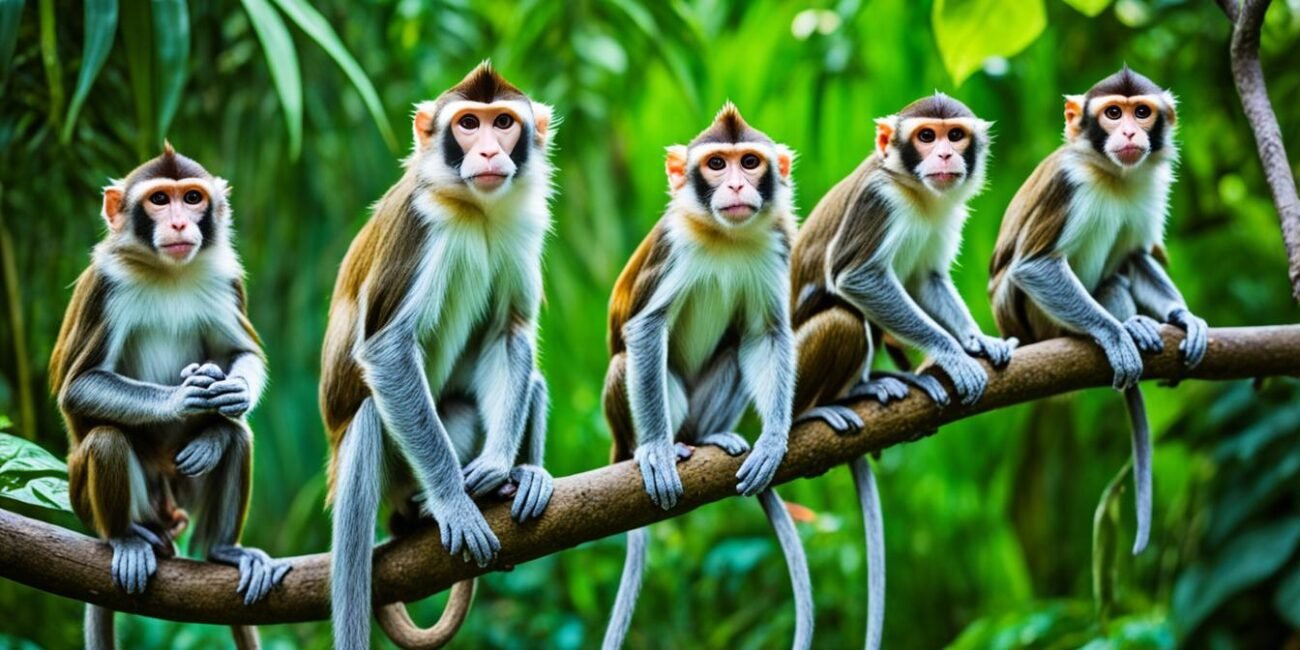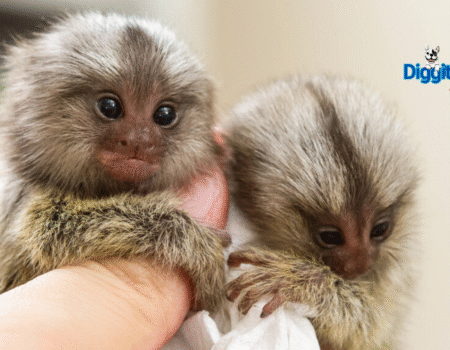Welcome to our comprehensive guide on types of pet monkeys. If you’ve ever been fascinated by the idea of having a primate as a pet, you’re not alone. Here, we will explore the different breeds of pet monkeys, the best species to consider, and the unique challenges and care requirements associated with keeping monkeys as pets. Whether you’re curious about exotic pet monkeys or simply interested in the popular pet monkey breeds, this guide will provide you with valuable insights and information.
When it comes to pet monkeys, it’s essential to understand that they require a significant amount of care and attention. Before diving into the world of primate ownership, it’s crucial to research the laws and regulations in your area regarding owning monkeys as pets. Some species may be illegal or require permits, so it’s important to be informed.
Another important consideration is the cost associated with purchasing and maintaining a pet monkey. From initial purchase costs to ongoing expenses, it’s essential to evaluate your budget and determine if you can provide for a pet monkey’s long-term needs. Additionally, monkeys have long lifespans and the potential for aggression, so understanding their behaviors and specific breed characteristics is crucial.
In this guide, we will delve into various pet monkey breeds, including popular choices like capuchin monkeys, squirrel monkeys, and macaques. By understanding the needs and characteristics of each breed, you can make an informed decision about which monkey is the right fit for you and your lifestyle.
Join us as we embark on this exciting journey into the world of pet monkeys, offering tips and insights on keeping them as pets and caring for their unique needs. Whether you’re searching for the best pet monkey species or curious about exotic pet monkeys, our guide has you covered. Let’s explore the wonderful world of pet monkeys together!
Are Pet Monkeys Good Pets? Considerations and Challenges
Owning a pet monkey can be a unique and fascinating experience, but it also comes with its fair share of challenges and considerations. Before embarking on this extraordinary journey, it’s essential to understand the various factors involved in owning a pet monkey. Let’s explore the legality, costs, potential risks, and responsibilities that come with bringing a monkey into your home.
Legality of Owning a Pet Monkey
The legality of owning a pet monkey varies depending on your location. Many states and jurisdictions impose strict regulations on primate ownership due to concerns about public safety and animal welfare. Some species may be strictly prohibited, while others may require permits or special licenses.
It is crucial to research the laws and regulations in your area before considering owning a pet monkey to ensure compliance and avoid legal issues.
Costs of Owning a Pet Monkey
The costs associated with owning a pet monkey can quickly add up. Beyond the initial purchase price, which can range from a few thousand to tens of thousands of dollars, there are ongoing expenses to consider. These include:
- Proper and specialized primate diet
- Enclosure maintenance and enrichment
- Diapers, if applicable
- Veterinary care and vaccinations
It’s important to budget for these expenses and ensure that you can meet the financial demands of providing appropriate care for your pet monkey.
Risks of Owning a Pet Monkey
While monkeys can be captivating and intelligent creatures, they are ultimately wild animals. As such, they have innate behaviors and instincts that can pose risks to both their owners and themselves. Monkeys have the potential to become aggressive, particularly as they mature, and they may exhibit destructive behavior if their needs are not met.
It is crucial to thoroughly understand the potential risks and responsibilities associated with owning a pet monkey before making a decision.
As the image above illustrates, pet monkeys require a significant amount of attention, training, and care to ensure their well-being. Understanding and mitigating these risks is essential to maintaining a harmonious and safe environment for both you and your pet monkey.
Capuchin Monkeys: The Mischievous Primate
Capuchin monkeys are widely sought after as pets due to their intelligence and playful nature. These mischievous creatures are known for their expressive faces and impressive problem-solving skills. If you are considering a capuchin monkey as a pet, it’s essential to understand the care and characteristics unique to this breed.
Characteristics of Capuchin Monkeys
- Highly intelligent: Capuchins are one of the smartest monkey species, capable of using tools and learning complex tasks.
- Mischievous and playful: Capuchins have a mischievous side and enjoy engaging in playful activities.
- Territorial nature: These primates are territorial and may exhibit aggressive behavior if they feel threatened or their belongings are challenged.
- Long lifespan: Capuchin monkeys have an average lifespan of around 40 years, so they require a long-term commitment.
If you decide to bring a capuchin monkey into your home, it’s crucial to provide them with proper care and attention.
Care for Capuchin Monkeys
Capuchin monkeys have specific needs that must be met to ensure their well-being:
- Diet: Capuchins require a varied and balanced diet consisting of fruits, vegetables, nuts, and protein sources.
- Enrichment and interaction: Mental stimulation is crucial for capuchins. They need plenty of toys, puzzles, and games to keep their intelligent minds active. Additionally, regular interaction with their human companions is essential.
- Vitamin D: Capuchins need exposure to natural sunlight or UVB lighting to synthesize vitamin D, important for their bone health.
- Diapers: It’s important to note that most capuchin monkeys do not learn to use the toilet and require diapers for their entire lives.
Proper care, a nutritious diet, and a stimulating environment are key to ensuring the well-being and happiness of capuchin monkeys as pets.
Capuchin Monkey Care Requirements
| Aspect of Care | Details |
|---|---|
| Diet | A varied diet consisting of fruits, vegetables, nuts, and protein sources |
| Enrichment | Engaging toys, puzzles, and regular interaction for mental stimulation |
| Vitamin D | Exposure to natural sunlight or UVB lighting for vitamin D synthesis |
| Diapers | Most capuchin monkeys require diapers throughout their lives as they do not typically learn to use the toilet |
Providing the necessary care and attention to capuchin monkeys is crucial to maintaining their overall health and well-being. Before considering a capuchin monkey as a pet, thoroughly research their needs and consult with experts to ensure you can provide a suitable environment for these mischievous primates.
Chimpanzees: Not Recommended as Pets
Although chimpanzees have been kept as pets in the past, it is not recommended due to several reasons. Chimps, unlike monkeys, are great apes and possess immense strength and the potential for aggression. This exceptional power can lead to serious harm or even death, as chimpanzees have mauled and killed humans in the past. Furthermore, chimpanzees have a long lifespan of around 60 years and require constant supervision. Whenever they are outside of their secure enclosure, chimpanzees must wear diapers to manage their waste effectively.
Given their size, behavior, and inherent needs, chimpanzees are not suitable as pets. These intelligent creatures belong in their natural habitat or reputable sanctuaries, where they can live their lives in a way that aligns with their true nature.
Macaques: Small Monkeys with Big Space Needs
Macaques are adorable and intelligent smaller monkey species that originate from Asia. They can weigh up to 40 pounds and live for up to 30 years, making them a significant commitment as pets. One of the essential aspects of caring for macaques is providing them with a suitable habitat that meets their specific space requirements.
These primates require large and secure enclosures to prevent them from getting lost or escaping. A minimum enclosure size of 30 square feet is recommended to give them enough room to move around and engage in natural behaviors. The enclosure should be sturdy and escape-proof, with plenty of areas for climbing and play. Macaques are highly active, so it is important to create an environment that allows them to burn off their energy.
In addition to space, macaques have unique dietary needs that must be met for their overall health and well-being. Their diet should consist of a variety of foods, including insects, fruit, tree sap, and other small animals. Providing a balanced and nutritionally rich diet is crucial to ensure their vitality and prevent any deficiencies.
In conclusion, macaques make charming and fascinating pets, but their care and habitat requirements should not be underestimated. By providing them with a spacious enclosure and a diverse diet, you can create a nurturing environment that allows them to thrive.
Tamarins and Marmosets: Tiny but Challenging Pets
Tamarins and marmosets are small New World monkey species that can make unique and fascinating pets. Despite their small size, caring for tamarins and marmosets can be quite challenging due to their specific needs and requirements.
Tamarins, weighing less than a pound, have an average lifespan of around 15 years. On the other hand, marmosets are squirrel-like monkeys from South America that share a similar size and lifespan. These tiny monkeys require owners who are dedicated and knowledgeable about their care.
One of the key considerations when keeping tamarins and marmosets as pets is their diet. These primates have specific dietary needs that must be met for their overall health and well-being. They require a varied and balanced diet that includes fruits, vegetables, insects, and even tree sap. Providing them with proper nutrition is essential for their growth and development.
Another important aspect of caring for tamarins and marmosets is ensuring they receive proper UV light exposure. These monkeys require access to natural sunlight or UV light bulbs to meet their UVB needs for Vitamin D synthesis. UV lighting helps maintain their bone health and prevents potential deficiencies.
Additionally, tamarins and marmosets need a secure enclosure with small bar spacing to prevent escape or injury. They are agile and inquisitive creatures that can easily fit through small openings. A well-designed enclosure with plenty of climbing opportunities and hiding places is necessary to keep them safe and stimulated.
“Caring for tamarins and marmosets requires dedication and a thorough understanding of their unique needs. By providing them with a suitable diet, UV light exposure, and a secure enclosure, you can create a safe and enriching environment for these tiny but challenging pets.”
Squirrel Monkeys: Acrobats in Need of Space
Squirrel monkeys are fascinating and highly active primates often sought after as pets. With their acrobatic abilities and playful nature, these monkeys can bring joy and entertainment to their owners. However, it’s important to understand the specific care requirements and space needs for squirrel monkeys to ensure their overall well-being.
Space Requirements for Squirrel Monkeys
One of the primary considerations when keeping squirrel monkeys as pets is providing them with ample space to move and engage in their natural behaviors. These energetic monkeys need an enclosure that allows them to climb and swing, mimicking their natural habitat. Hanging branches, ropes, and platforms should be incorporated to create a stimulating environment for them.
Squirrel monkeys should be allowed plenty of vertical and horizontal space to explore and exercise. They are agile climbers, and their enclosure should have enough room for them to jump and swing without restrictions. Experts recommend an enclosure size of at least 64 square feet for a pair of squirrel monkeys.
Care for Squirrel Monkeys
In addition to providing a spacious enclosure, it’s crucial to meet the dietary and behavioral needs of squirrel monkeys. These monkeys have a varied diet consisting of fruits, vegetables, insects, and occasional small amounts of protein. A well-balanced diet is essential for their overall health and vitality.
“When caring for squirrel monkeys, it’s important to remember that they have a long lifespan of up to 25 years. This requires a long-term commitment and dedication to their care.”
It’s also important to note that squirrel monkeys wear diapers throughout their entire lifespan. Ensuring proper hygiene and regular diaper changes is essential for their comfort and cleanliness.
Interaction and Enrichment
Squirrel monkeys are highly social animals and thrive on interaction with their human companions. Spending time with them, providing mental stimulation, and engaging in play is crucial for their well-being. Squirrel monkeys are intelligent creatures and enjoy puzzle toys, foraging activities, and games that challenge their problem-solving abilities.
Additionally, it’s important to provide them with ample opportunities for exercise and exploration. Squirrel monkeys thrive when given plenty of time outside their enclosure to climb and play in safe, supervised environments.
The Joy of Squirrel Monkey Ownership
Owning a squirrel monkey can be a rewarding experience for those who can meet their unique needs. These acrobatic primates are full of energy and personality, bringing joy and fascination to their owners. However, it’s crucial to ensure that you have the necessary resources, knowledge, and commitment to provide a suitable environment and care for these remarkable creatures.
Guenons: High Maintenance and Social Monkeys
Guenons, native to the lush forests of sub-Saharan Africa, are an intriguing choice for those considering monkeys as pets. However, it’s important to understand that guenons require a significant amount of care and attention to thrive in a domestic environment.
One key aspect to consider when caring for guenons is their need for ample space. These monkeys are highly active and require a spacious enclosure that allows for climbing, jumping, and exploration. Providing them with an environment that mimics their natural habitat will help keep them physically and mentally stimulated.
It’s also crucial to address the social needs of guenons. These monkeys are highly social animals and thrive when living in large groups or troops. Consider keeping multiple guenons together to ensure their emotional well-being. Social interactions are essential for their mental stimulation and overall happiness.
Key Points:
- Guenons are from the forests of sub-Saharan Africa.
- They require a significant amount of space in their enclosures.
- Guenons thrive in large groups or troops.
Proper care for guenons extends beyond their living arrangements and social needs. These monkeys have specific dietary and environmental requirements that must be met to ensure their well-being. By providing a balanced and varied diet that includes fruits, vegetables, and protein sources, you can support their nutritional needs.
Guenons are fascinating creatures that require a high level of care due to their social nature and space needs. However, if their care needs are properly met, guenons can be incredibly rewarding and enjoyable pets.
It’s worth noting that guenons have a lifespan of up to 25 years, so committing to their care is a long-term responsibility. They also require regular veterinary check-ups and vaccinations to maintain their health.
By understanding and meeting the needs of guenons, you can provide them with a fulfilling and enriching life as pets.
Legal Considerations for Owning a Pet Monkey
Before deciding to own a pet monkey, it is crucial to research and understand the legal considerations involved. Many states and jurisdictions have specific laws and regulations regarding primate ownership. Some monkey species may be illegal to own, while others may require permits or special licenses. It is important to comply with these regulations to avoid fines and other legal repercussions. Research your local laws and consult with relevant authorities to ensure you can legally and responsibly own a pet monkey.
Primate Ownership Regulations
| State | Monkey Species Allowed | Permit Requirements |
|---|---|---|
| California | Capuchin, Squirrel monkeys | Permit required |
| Florida | Capuchin, Squirrel monkeys, Tamarins | Permit required |
| Texas | Capuchin, Squirrel monkeys, Rhesus macaques | Permit required for certain species |
| New York | None | Monkeys prohibited |
Owning a pet monkey without the necessary permits or in violation of local regulations can result in legal consequences, including confiscation of the animal and fines. It is essential to familiarize yourself with the specific laws governing primate ownership in your area. Always ensure that you are obtaining a monkey from a reputable and legal source to avoid contributing to the illegal wildlife trade.
“It is important to comply with primate ownership regulations to protect the welfare of both the animals and the public.” – Animal Control Officer Jane Smith
By responsibly adhering to primate ownership regulations, you can ensure the well-being of your pet monkey and contribute to the conservation efforts for their wild counterparts.
Care and Maintenance of Pet Monkeys
Pet monkeys require attentive care and consistent maintenance to ensure their well-being. From providing a nutritious diet to regular veterinary check-ups, meeting their specific needs is essential for their overall health and happiness.
Dietary Needs
Monkeys have diverse dietary requirements that must be met to maintain their optimal health. A balanced diet for pet monkeys typically consists of:
- Fresh fruits and vegetables
- High-quality primate pellets
- Protein sources, such as cooked lean meats or insects
- Nuts and seeds in moderation
It is important to consult with a veterinarian or primate nutritionist to create a diet plan that suits your monkey’s specific species and individual needs.
Enrichment and Social Interaction
Pet monkeys thrive on social interaction and mental stimulation. They require plenty of enrichment activities and playtime to keep them engaged and prevent boredom. Some ways to provide enrichment for pet monkeys include:
- Providing toys that encourage foraging and problem-solving
- Rotating toys regularly to maintain their novelty
- Offering opportunities for physical exercise, such as climbing structures and branches
- Engaging in interactive play and bonding time
Remember, monkeys are highly intelligent creatures that require mental and physical stimulation to prevent boredom and behavioral issues.
Veterinary Care
Regular veterinary care is crucial for the well-being of pet monkeys. Finding a veterinarian experienced in primate care is essential, as they will have the knowledge and expertise to provide the necessary medical attention and preventive measures. Veterinarians who specialize in primate care can assist with:
- General wellness check-ups
- Vaccinations and parasite control
- Dental care
- Identification and treatment of any health issues
By maintaining a strong veterinarian-client relationship, you can ensure that your pet monkey receives the best possible care.
Remember, providing proper care and maintenance for your pet monkey is a long-term commitment. If you are unable to meet their specific needs or provide the necessary care, consider alternative options such as supporting reputable sanctuaries or wildlife conservation efforts.
Creating a Monkey-Friendly Environment
When it comes to keeping pet monkeys, creating a monkey-friendly environment is essential for their happiness and overall well-being. Monkeys are highly active and curious creatures, and they thrive in an environment that allows them to move, climb, and play to their heart’s content.
To provide a suitable enclosure setup for pet monkeys, it is important to prioritize space. Ensuring that the enclosure is spacious enough for monkeys to roam freely is crucial. Incorporating climbing structures, platforms, and branches will mimic their natural habitat and provide opportunities for exercise and exploration.
Additionally, toys and enrichment activities play a vital role in keeping pet monkeys mentally stimulated and engaged. Regularly rotating toys and introducing new enrichment activities can prevent boredom and encourage monkeys to exhibit natural behaviors such as foraging and problem-solving.
A monkey-friendly environment can be further enhanced by adding live plants and vegetation. Not only do they contribute to a more naturalistic and visually appealing setting, but they also provide monkeys with opportunities for self-grooming, exploration, and interaction.
By creating a monkey-friendly environment that incorporates ample space, climbing structures, toys, and enrichment activities, you can ensure that your pet monkey remains active, stimulated, and content.
Training and Socialization for Pet Monkeys
Training and socialization play a vital role in the development of a strong bond with your pet monkey and maintaining manageable behavior. Positive reinforcement techniques, such as rewards and clicker training, have proven to be effective in teaching monkeys desired behaviors. By using these methods, you can communicate with your pet monkey and encourage them to learn and respond to your commands.
In addition to training, providing opportunities for socialization is crucial for the emotional well-being of pet monkeys. Monkeys are social creatures by nature, and socializing with other monkeys or humans helps to fulfill their social needs. Introduce your monkey to other well-socialized monkeys in controlled environments and allow them to engage in positive interactions. Similarly, spend quality time with your monkey, engaging in activities that promote bonding and trust.
Dedication of time and effort to training and socializing your pet monkey is essential in shaping them into a well-behaved and harmonious companion. Remember to use positive reinforcement, be patient, and maintain consistency in your training approach. Always respect the natural instincts and limits of your monkey, as training should focus on encouraging desirable behaviors rather than attempting to change their fundamental nature.
FAQ
What are the different types of pet monkeys?
There are several types of pet monkeys commonly kept as pets, including capuchin monkeys, chimpanzees, macaques, tamarins, marmosets, squirrel monkeys, and guenons.
Are pet monkeys good pets?
Owning a pet monkey comes with challenges and considerations. They require a significant amount of care, specific diets, and socialization. Additionally, there are legal considerations and potential risks involved in owning a pet monkey.
What are the characteristics of capuchin monkeys as pets?
Capuchin monkeys are highly intelligent and mischievous creatures. They have a long lifespan and require a substantial amount of care. Most capuchin monkeys do not learn to use the toilet and need diapers for their entire lives.
Why are chimpanzees not recommended as pets?
Chimpanzees are great apes, not monkeys, and are known for their strength and potential for aggression. They can cause serious harm or even death. Due to their size and behavior, chimpanzees are not suitable pets.
What are the care requirements for macaques as pets?
Macaques are smaller monkey species that require large and secure enclosures. They need a varied diet and should have a minimum enclosure size of 30 square feet.
What are the challenges of owning tamarins and marmosets as pets?
Tamarins and marmosets are small monkey species with specific diet and UV light needs. They require a secure enclosure with small bar spacing to prevent escape or injury.
How much space do squirrel monkeys need as pets?
Squirrel monkeys are known for being acrobatic and require a lot of space. They need hanging branches for climbing and play. Their enclosure should mimic their natural habitat and provide ample opportunities for movement and exercise.
What are the social needs of guenons as pets?
Guenons are high-maintenance pets that thrive in large groups. It is recommended to keep a troop of guenons to meet their social needs.
What are the legal considerations for owning a pet monkey?
It is important to research and understand the laws and regulations regarding primate ownership in your area. Some monkey species may be illegal to own, and others may require permits or special licenses.
What is involved in the care and maintenance of pet monkeys?
Pet monkeys require a diverse and fresh diet, social interaction, enrichment, and regular veterinary care. Finding a veterinarian experienced in primate care is crucial for their overall health and well-being.
How can I create a monkey-friendly environment for my pet?
Providing a spacious enclosure with climbing structures, platforms, and toys can help create a monkey-friendly environment. Incorporating live plants and vegetation can also add to the naturalistic feel.
How can I train and socialize my pet monkey?
Training and socialization are crucial for developing a bond with your pet monkey. Positive reinforcement techniques and providing opportunities for socialization with other monkeys or humans can help foster a well-behaved companion.










No Comment! Be the first one.